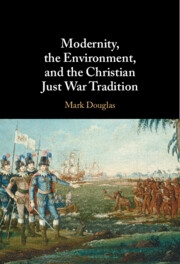Book contents
- Modernity, the Environment, and the Christian Just War Tradition
- Modernity, the Environment, and the Christian Just War Tradition
- Copyright page
- Contents
- Acknowledgments
- Introduction: Troubling a Tradition
- 1 Engaging the Other
- 2 Understanding the Self
- 3 Shaping the State
- 4 State Time/Secular Time
- 5 Christian Just War Thinking and Modernity
- 6 Historical Roots and Roads Not Taken
- 7 Renarrating the Christian Just War Tradition
- Afterword
- Select Bibliography
- Index
6 - Historical Roots and Roads Not Taken
An Environmental History of (Part of) the Christian Just War Tradition
Published online by Cambridge University Press: 05 May 2022
- Modernity, the Environment, and the Christian Just War Tradition
- Modernity, the Environment, and the Christian Just War Tradition
- Copyright page
- Contents
- Acknowledgments
- Introduction: Troubling a Tradition
- 1 Engaging the Other
- 2 Understanding the Self
- 3 Shaping the State
- 4 State Time/Secular Time
- 5 Christian Just War Thinking and Modernity
- 6 Historical Roots and Roads Not Taken
- 7 Renarrating the Christian Just War Tradition
- Afterword
- Select Bibliography
- Index
Summary
Taking up Lynn White, Jr.’s argument that Christianity is largely responsible for contemporary ecological crises, this chapter develops an environmental historical reading of the Christian just war tradition’s transition from its late medieval into its early modern forms. That reading reveals not only the flaws in White’s argument but the many ways that the nonhuman natural world was understood by late medieval just war thinkers, including as resource, brake, enemy, and collection of signs. Attending to the environmental conditions and human interactions with the nonhuman natural world that shaped late medieval Europe and gave rise to early modern projects of colonialization and conquest helps to clarify the range of forces at work in shaping just war thinking and modernity. Among the implications of an environmental historical reading of the history of Christian just war, thinking is not only a recognition of the ways that the natural and the political interact but the need for a richer vocabulary to express those interactions in a time of growing climate-shaped violence.
Keywords
- Type
- Chapter
- Information
- Modernity, the Environment, and the Christian Just War Tradition , pp. 246 - 288Publisher: Cambridge University PressPrint publication year: 2022

